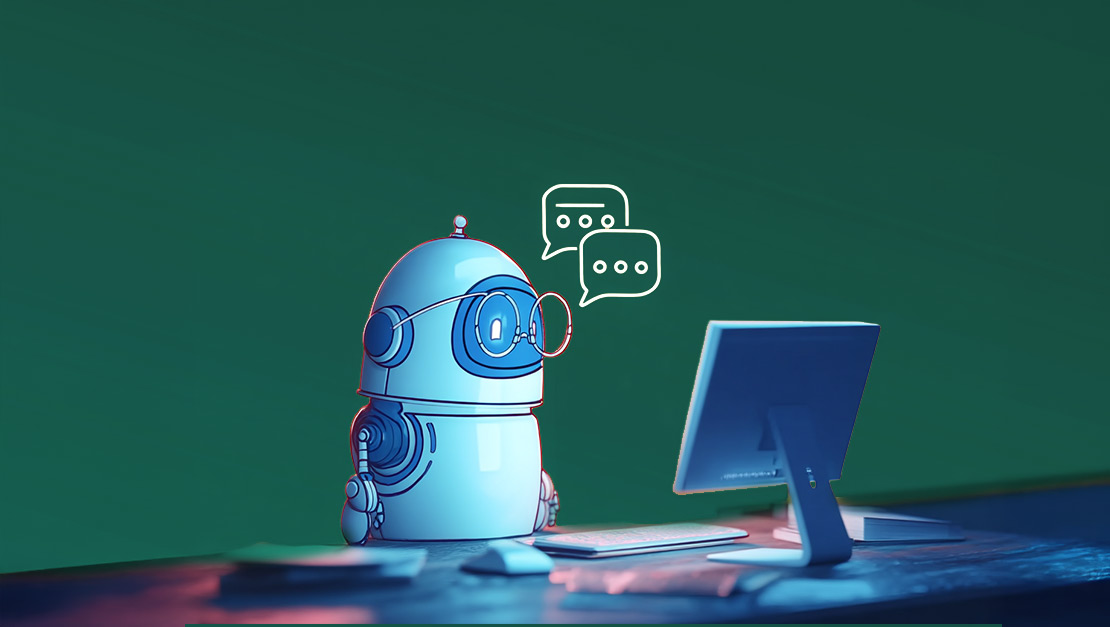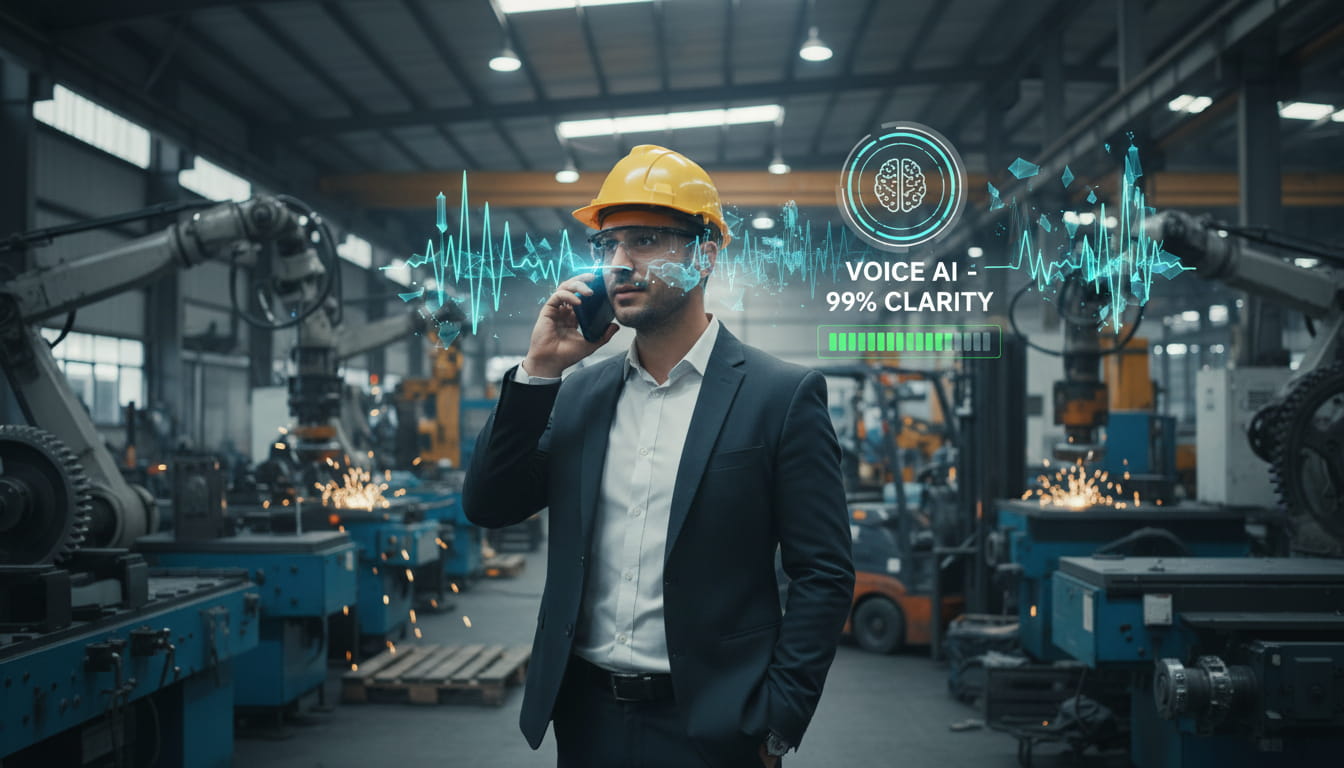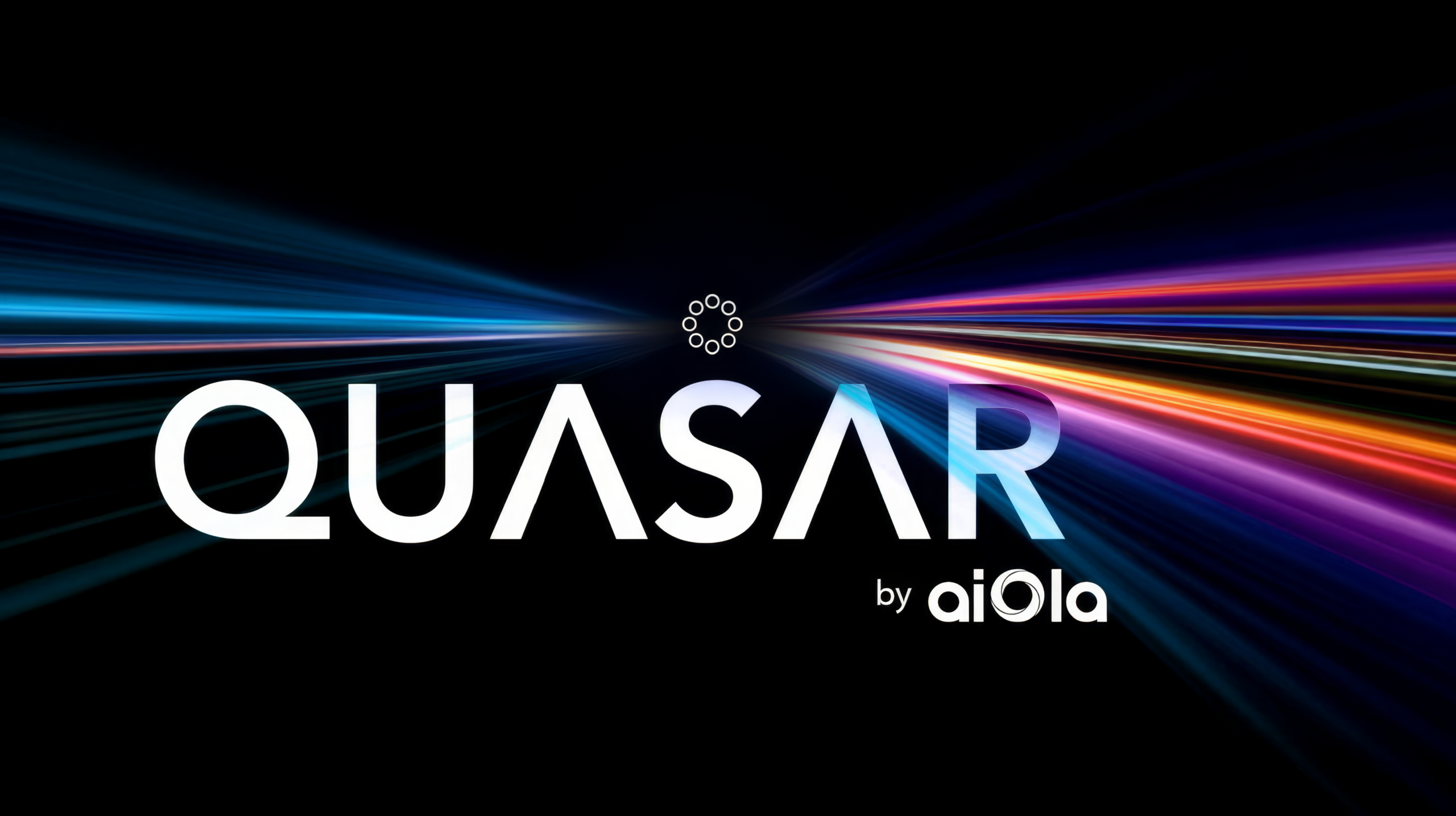Finding an enterprise conversational AI platform that actually fits your business needs isn’t as simple as picking the one with the flashiest demo. You need something that works at scale, handles industry-specific language, and integrates cleanly into your existing systems—and not every tool out there is built with that in mind.
In this post, we’ll walk through what enterprise conversational AI platforms are really designed to do, what features matter most depending on your use case, and how the top solutions compare. Whether you’re focused on transcribing complex meetings, automating workflows via voice, or improving team communication across global offices, this guide will help you make a smarter choice.
What Are Enterprise Conversational AI Platforms?
At their core, enterprise conversational AI platforms are designed to turn spoken language into structured, actionable data—at scale. That means real-time transcription, speech recognition, and natural language understanding across teams, departments, and even continents.
Unlike consumer-level tools, enterprise solutions are built for business environments where accuracy, security, and integration matter. These platforms do more than just listen—they interpret, tag, and route information so your teams can move faster with fewer errors.
Some of the key features you’ll typically find in a strong conversational AI for enterprise include:
- Real-time, accurate transcription
- Domain-specific jargon handling
- Support for multiple speakers and languages
- Integration with internal tools via API
- Enterprise-grade privacy and compliance
- Low maintenance, often requiring no model training
Now that we know what we’re looking at, let’s compare the platforms leading the space.
The Best Enterprise Conversational AI Platforms
Here are five platforms that are making serious moves in the enterprise space. Each has its strengths and ideal use cases, but one in particular stands out for businesses looking for precision and performance without the overhead.
aiOla – Built for Business from the Ground Up
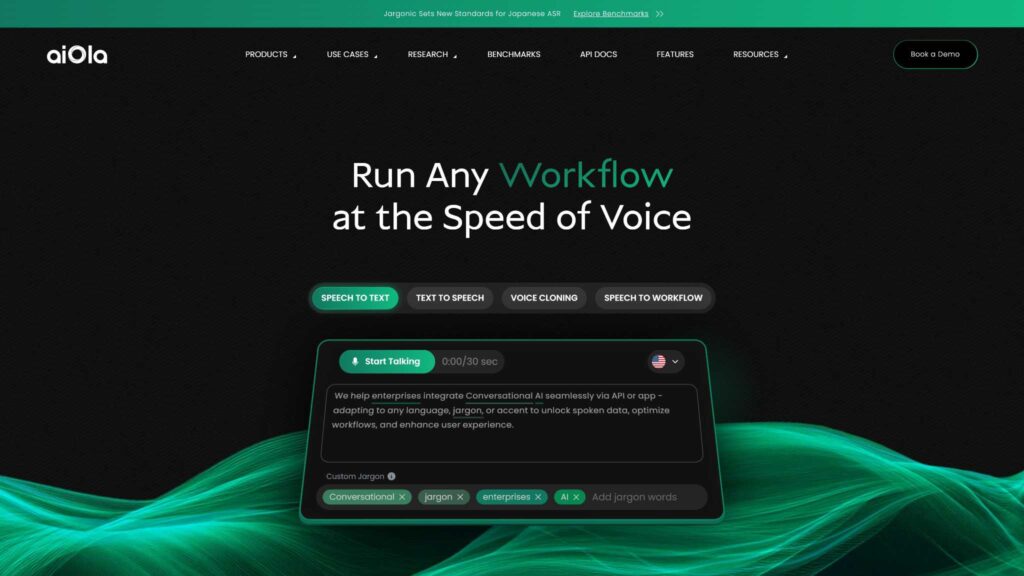
aiOla is redefining what enterprise conversational AI should look like. It’s one of the only platforms purpose-built for business use, with features like advanced jargon recognition, zero-shot learning, and multi-speaker handling in noisy environments.
Where aiOla stands out:
- No training or retraining needed. It understands context and industry-specific terms immediately.
- Supports over 120 languages with high accuracy.
- Jargonic V2 delivers 15.1% word error rate on AMI meeting benchmarks, outperforming major competitors.
- Handles noisy, real-world environments without sacrificing transcription quality.
- Strong on data privacy, meeting regulatory standards.
- Easy to integrate through flexible APIs.
aiOla is especially useful anywhere complex terminology and voice-based workflows are common.
Whisper Large v3 – OpenAI’s Generalist Model
OpenAI’s Whisper Large v3 has built a reputation for accuracy and accessibility. It’s a popular open-source solution, ideal for developers and researchers looking to build their own voice tools.
Strengths:
- Good multilingual transcription.
- High overall accuracy.
- Open-source and customizable.
Drawbacks:
- Not built specifically for enterprise workflows.
- Lacks domain-specific understanding.
- Requires technical setup and ongoing optimization.
Whisper is best suited for teams that want a flexible base model to build on, but it may require more engineering resources to deploy effectively in a business environment.
ElevenLabs – Focused on Voice Generation, Not Enterprise Speech
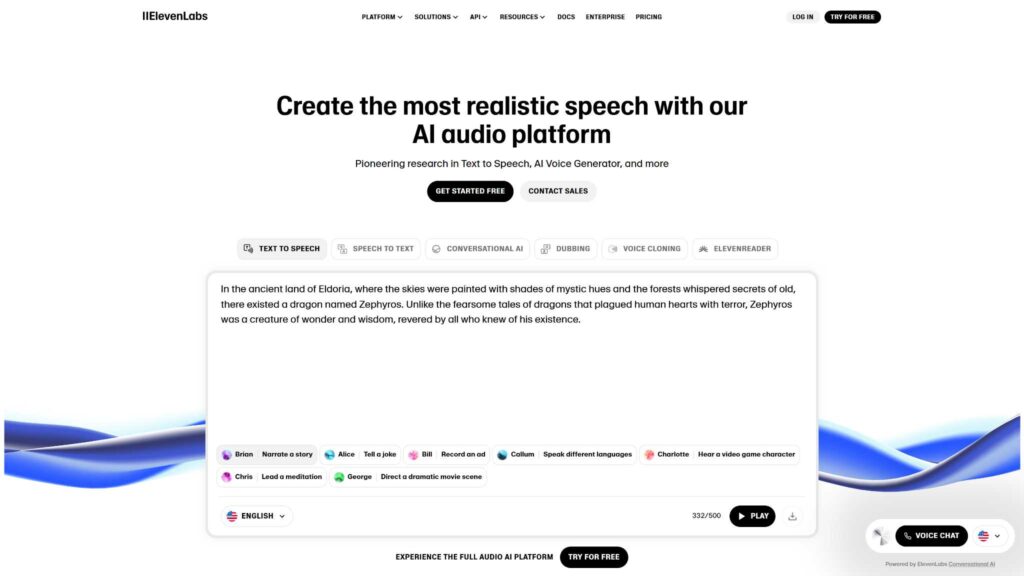
ElevenLabs is known for its realistic AI-generated voices and support for 32 languages. It’s a favorite among creators, especially in media, gaming, and entertainment.
What it does well:
- High-quality voice synthesis.
- Emotionally expressive and lifelike output.
- Great for content localization.
Where it falls short:
- Not built for speech-to-text transcription.
- Doesn’t handle enterprise jargon or complex terminology well.
- Limited real-time or noisy environment support.
If your focus is on voice creation, ElevenLabs is useful. But if you’re looking for a robust enterprise conversational AI platform, it’s not the right tool.
AssemblyAI – Developer-Friendly with Solid Transcription
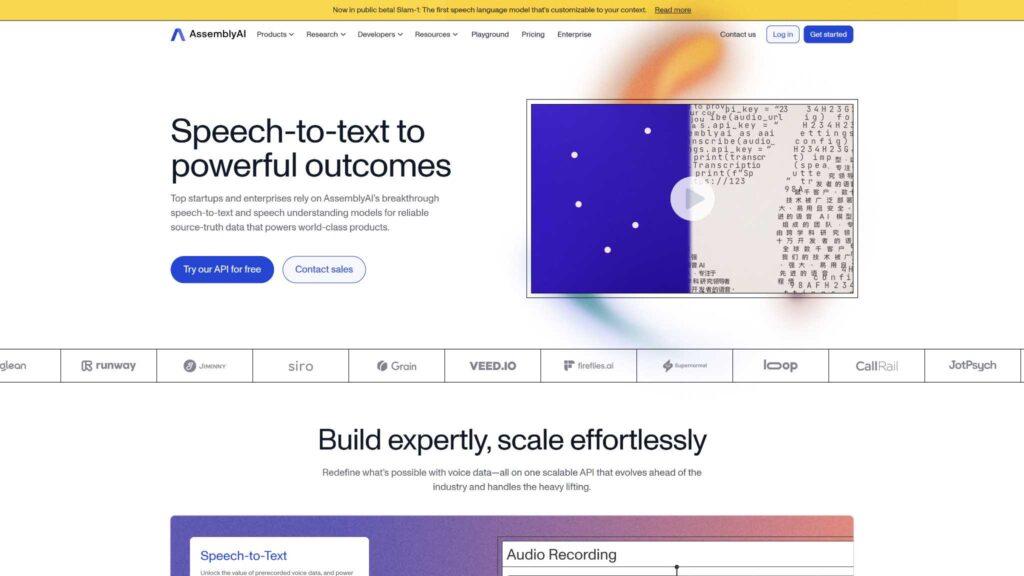
AssemblyAI offers a broad set of speech recognition tools and strong documentation, making it popular with technical teams building custom voice solutions.
Pros:
- Good speaker identification.
- Real-time transcription available.
- Useful NLP features like sentiment analysis and topic detection.
Cons:
- Requires integration and configuration.
- Not built with jargon recognition in mind.
- May not perform as well in highly noisy environments.
AssemblyAI is a good choice if you have the dev team to integrate and configure it to fit your workflow.
Deepgram Nova 2 – Fast, Lightweight, and Affordable
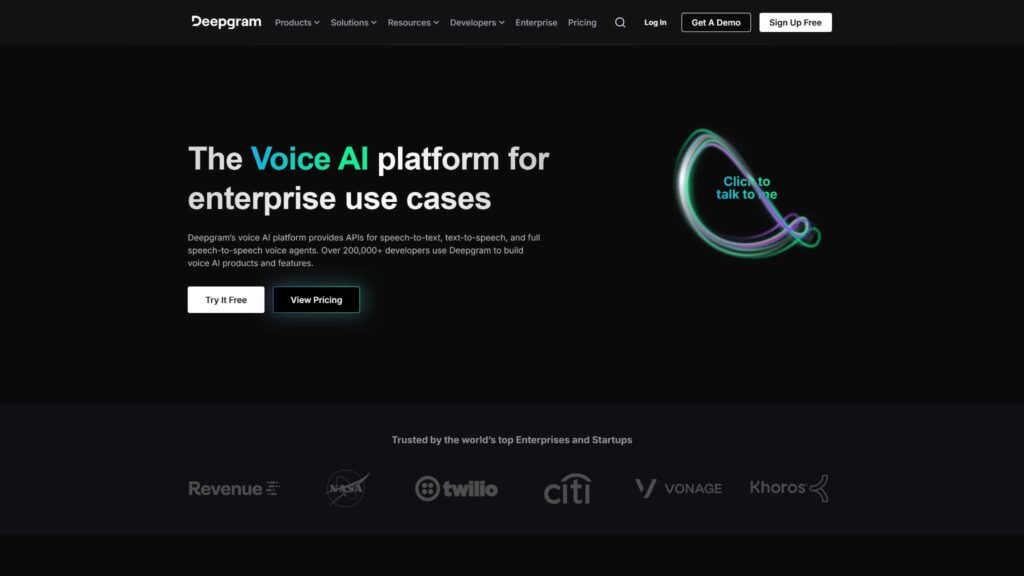
Deepgram’s Nova 2 model is known for speed and ease of deployment. It’s especially useful in customer support and virtual assistant applications where latency is key.
Advantages:
- Low latency transcription.
- Multiple language support.
- Scalable and cost-effective.
Limitations:
- Less accurate with domain-specific terminology.
- Basic noise handling.
- Not optimized for enterprise-specific use cases.
Deepgram works best for voice apps and front-line interactions, but businesses with more specialized needs may find themselves limited.
How to Choose the Best Speech-to-Text Model
Picking the right solution comes down to a few key factors. Let’s break them down so you know what to look for when evaluating a platform:
Efficiency
You want a platform that works in real time or near real time. Delays slow down your workflows and lead to lost productivity. Look for low-latency processing and quick deployment. aiOla and Deepgram are both strong in this area, with aiOla offering the added bonus of no training needed.
Accuracy
This is where things really start to matter. Accuracy isn’t just about getting the words right—it’s about getting the right words. If your platform can’t understand the language your team uses every day, you’ll spend more time correcting transcripts than using them. aiOla leads the pack in this area.
Word Error Rate (WER)
This is the gold standard for comparing transcription performance. Lower is better. aiOla’s Jargonic V2 consistently scores a best-in-class 15.1% on the AMI benchmark. For context, that beats Whisper and AssemblyAI by a clear margin.
Jargon Recognition
Generic platforms can stumble when they hear acronyms, specialized terms, or industry lingo. This is where aiOla’s zero-shot learning shines—no need to train the model on your terminology. It just understands.
Multi-Speaker and Noisy Environments
In real life, conversations aren’t always clean and quiet. You need a model that can handle people talking over each other, background noise, and different accents. aiOla is specifically tuned for this, which is critical in team meetings and customer service environments.
Data Privacy and Compliance
If you’re in a regulated industry, this is non-negotiable. aiOla is enterprise-ready on all counts. Whisper and other open models may not meet enterprise compliance standards out of the box.
API Integration
If a platform can’t connect to your existing systems, it’s a dead end. All the platforms we covered offer APIs, but the ease of integration varies. aiOla provides robust support to get up and running quickly.
Final Thoughts on the Best Conversational AI Platform
If you’re exploring enterprise conversational AI platforms, tools like Whisper, ElevenLabs, and Deepgram offer solid capabilities for general transcription and creative voice applications—but when it comes to enterprise-grade needs, they fall short.
If your business relies on high accuracy, seamless integration, and the ability to understand complex, domain-specific language without model training, aiOla stands out. With industry-leading word error rates, zero-shot jargon recognition, support for over 120 languages, strong performance in real-world environments, and built-in compliance, aiOla is built from the ground up for enterprise use.
Ready to see it in action? Book a demo today and discover how aiOla can transform your voice-driven workflows.

